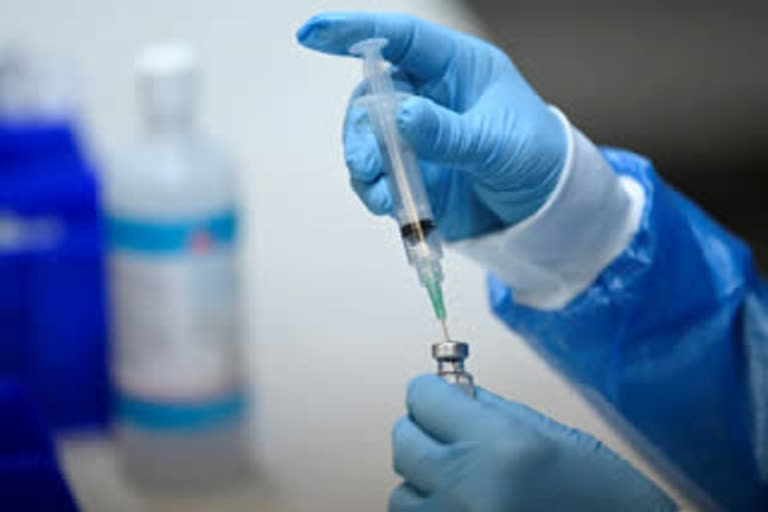New Delhi: Amidst a major concern over the delta (B.1.617.2) variant of SARS-CoV-2 infection, the latest study compiled by international science journal “Nature” said that mRNA vaccine protects against the deadly delta variant which was first detected in India.
BNT162b2, an mRNA vaccine that expresses the full prefusion spike glycoprotein of SARS-CoV-2, showed an efficacy of 95 per cent against Covid-19.
“As part of ongoing diligence on coverage of variants by the BNT162b2 vaccine, we have engineered variant spike genes using the gold standard PRNT50 assay, we have tested neutralization of the resulting viruses by a panel of BTN162b2-immunized human sera drawn 2 or 4 weeks after two doses of BNT162b2 given three weeks apart. Among all tested viruses, those with spike proteins from B.1.3514 and B.1.617.1 exhibited the greatest reduction in neutralization by the sera,” the study compiled by nature said.
A recent real-world study in participants who had received two doses of BNT162b2 demonstrated the effectiveness of 75 per cent against any documented infection and 100 per cent against documented severe, critical, or fatal disease caused by the variant B.1.35125, which showed a similar reduction of neutralization titers as B.1.617.1, Nature said in its study.
Both the variants B.1.617.1 (Kappa) and B.1.617.2 (Delta) were first detected in India. It may be mentioned here that the Delta variant was the major cause of the spike of Covid cases and deaths in the second wave.
“Consistent with the modest reduction in the neutralization of the B.1.617.2 variants by BNT162b2-elicited sera, a test-negative case-control study conducted in the United Kingdom found that the real-world effectiveness of two doses of BNT162b2 against B.1.617.2 virus was only modestly reduced to 87.9 per cent, compared to 93.4 per cent effectiveness against B.1.1.7 lineage virus. BNT162b2 elicits not only neutralizing antibodies but also spike-specific cells and non-neutralizing antibody-dependent cytotoxicity, which can also serve as immune effectors,” it said.
Also read:US to purchase, donate half a billion Pfizer vaccines to 92 countries
The study said that new variants will continue to emerge as the pandemic persists. “To date, there is no evidence that virus variants have escaped BNT162b2-mediated protection from Covid-19. Therefore, increasing the proportion of the population immunized with current safe and effective authorized vaccines remains a key strategy to minimize the emergence of new variants and end the Covid-19 pandemic,” Nature said in its study.
When contacted, Dr Tamorish Kole, president of Asian Society of Emergency Medicine told ETV Bharat, “Most traditional vaccines consist of either killed or weakened forms of a virus or bacterium which provoke an immune response that allows the body to fight off the actual pathogen later on. mRNA vaccines on the other hand deliver genetic information that allows the body’s own cells to produce a viral protein which in turn stimulates the immune system to mount a response, without posing any risk of infection.”
He said that there are variants of concern (VOCs) of the SARS-CoV-2 virus which continue to emerge and spread globally and the efficacy of the vaccines that were designed using the original form of the virus remains a cause of concern.
“Two studies published in May this year in Lancet and New England Journal of Medicine (NEJM), suggest that the Pfizer-BioNTech vaccine remains highly effective against the B.1.1.7 and B.1.351 variants. Moderna has also recently released a statement indicating that early results from an ongoing study of a booster shot are encouraging with regard to the B.1.351 and P.1 variants,” said Dr Kole.
Like their global counterparts, the two vaccines authorised in India, Covaxin and Covishield, are also effective against VOCs at present time. A recent ICMR study demonstrated that despite a reduction in neutralisation titres with Covaxin sera against B.1.351 (beta) and B.1.617.2 (delta), its neutralisation potential is retained.
Also read:SCBA to provide Covid vaccine for 18-44 age group in SC campus from Monday
“Moreover, these vaccines are advantageous in terms of storage and distribution which is most suited for Indian conditions. Both Covishield and Covaxin can be stored at 2-8° Centigrade, which is a household refrigerator temperature,” Dr Kole said.
It may be mentioned here that Covishield uses a replication-deficient chimpanzee viral vector based on a weakened version of a common cold virus (adenovirus) that causes infections in chimpanzees and contains the genetic material of the SARS-CoV-2 virus spike protein.
Covaxin, on the other hand, is an inactivated vaccine. This destroys the pathogen’s ability to replicate but keeps it intact so that the immune system can still recognise it and produce an immune response.



